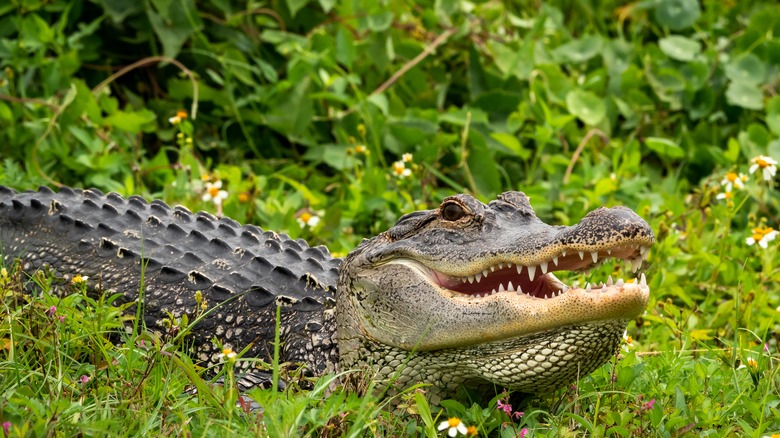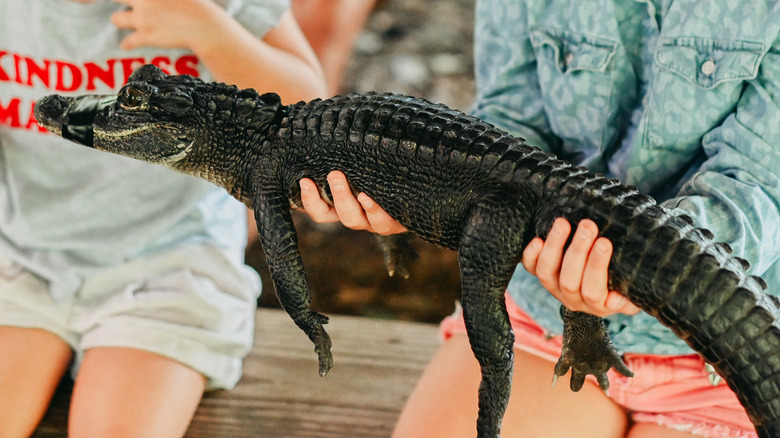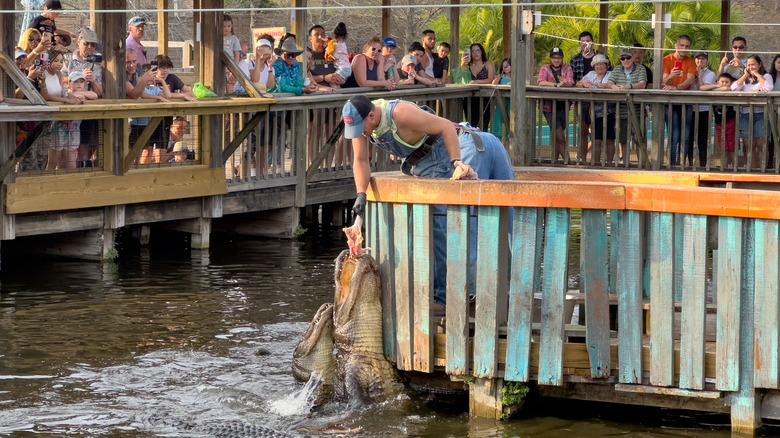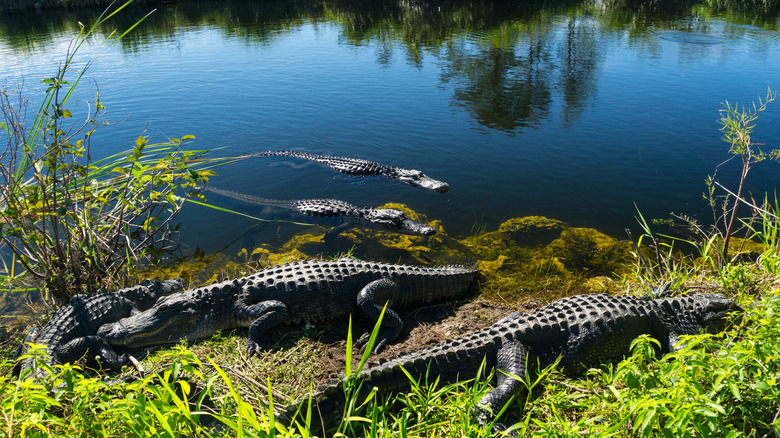The Upsetting Reason You Should Think Twice Before Visiting An Alligator Farm In Florida
In the public consciousness, Florida is deeply linked with alligators. It's true, within the state borders there are an estimated 1.3 million alligators, far more than there are human beings. These powerful reptiles have become a part of the state's identity, and travelers in Florida will see dozens and dozens of businesses with "gator" in the name during their trip. The majority of those are simply referencing their state's most popular animal, but a few promise to provide their customers with an up-close encounter with one of these reptiles.
Every year tourists visiting Florida for sunny beaches also go to attractions, usually referred to as alligator parks or farms, promising an encounter with the giant reptiles. As enticing as the opportunity to see, feed, or even hold an alligator might sound, the reality is not as magical as the advertisements. If you are an animal lover hoping for an exciting experience while you visit the Sunshine State, you will want to skip a lot of the alligator-themed tourist traps that you may come upon — but that doesn't mean that you can't catch an exhilarating glimpse of one in the wild.
These are tourist traps
"I signed up for an Everglades tour promoted by a hotel ..." one frustrated Tripadvisor user posted. "The tour group was dropped off at a farm to watch a cowboy wrestle with an alligator in an enclosure."
This disappointed tourist is far from alone. Every year, many tourists come to Florida hoping to see an alligator in real life only to find themselves in an unpleasant tourist trap, overcharging them for views of exploited animals in small cages being improperly handled. As noted by Casey Riordan, a graduate of New York University's inaugural Animal Studies program, in an interview with People, many farms and tours present themselves as promoting alligator conservation to attract animal lovers and then do nothing more than repeat a few sensational headlines about alligator attacks before physically wrestling the animals and wrenching their jaws open so the crowd can see their teeth.
Like other tourist traps around the world, what is being shown is essentially fake, but that doesn't mean it doesn't have real consequences for the animals. The alligators are definitely agitated — and that's intentional. Performers in alligator shows intentionally frustrate or hurt the alligators to make it seem like they are fighting back before being wrestled down, flipped over, and in extreme cases, choked to unconsciousness.
These animals are being exploited
While the state's cultural identity is connected to alligators, historically, alligators have been killed, abused, and exploited for entertainment in Florida for a very long time. Tourists can see alligators at attractions referred to as parks and farms that are generally little more than tourist traps or roadside zoos where the animals are poorly cared for and then forced into stressful and sometimes painful situations to entertain visitors.
Often these attractions have very small enclosures that do not provide enough space for even one alligator, meaning that they are trapped with no way to swim or move around. Worse, many also stock multiple large male alligators together, because it is exciting for tourists to see. Unfortunately, the males are naturally territorial. Being kept together in confined spaces and often fed by tourists in a way that encourages competition is stressful, dangerous, and even potentially deadly for the animals.
Some restaurants offer guests the option to hold baby alligators. As charming as the idea sounds, these animals are supposed to remain with their mothers for the first couple years of life, per The Key West Aquarium, and were often taken while still too young. They also generally have their jaws taped shut to prevent them from biting, which leaves them defenseless.
A better way to see alligators in Florida
While these tourist traps claim to offer travelers the best chance to see alligators in Florida, there is a much better option. Travelers in Florida have the opportunity to visit the incredible Everglades National Park and various other nature preserves throughout the state where they can see alligators in their natural habitat.
While it is certainly possible to see an alligator at any time in Florida, the best time to see an alligator at Everglades National Park is in the winter dry season when the water level is lowest. This means that most wildlife, including alligators, will go to the areas where there is still water, like Shark Valley, the Anhinga Trail, and Eco Pond. The area near the Shark Valley Visitor Center is a particularly good option for travelers who want a comfortable and relaxing experience but would still like to see alligators in their natural habitat. The 15-mile walk is fully paved, meaning that it's possible to bicycle on a road instead of hiking through the wilderness. There is even a two-hour tram tour available so that visitors to the park can see alligators free in the wild without having to get too close.



